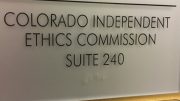By Jeffrey A. Roberts
CFOIC Executive Director
The Colorado Court of Appeals heard arguments Tuesday about whether a state law that makes educator evaluation records confidential also shields the disciplinary records of Denver Public Schools administrators.
A Denver District Court judge ruled last year that four years of “FRISK” summaries sought by Denver Gazette reporter David Migoya are not “personnel files” exempt from disclosure under the Colorado Open Records Act. But she agreed with DPS that allowing public inspection “would substantially injure the public interest.”

The Denver School Leaders Association, which represents principals and assistant principals, intervened in the case after the newspaper appealed, contending the FRISK disciplinary memos cannot be disclosed because of the statute on educator evaluation records. (FRISK is a human resources acronym for facts, rule, impact, suggestions and knowledge.)
That law, which the legislature expanded during the 2024 session, says that an educator’s evaluation report “and all public records … that are used in preparing the evaluation report are confidential.”
Joseph Goldhammer, attorney for the school leaders’ association, told a three-judge Court of Appeals panel the statute “overrules” a provision in CORA that ensures disclosure of a public employee’s performance ratings. And, he argued, it covers an educator’s disciplinary records.
“If you were doing somebody’s evaluation, wouldn’t you want to know what discipline was imposed upon them during the evaluation period?” Goldhammer asked the three judges.
But Rachael Johnson, a Reporters Committee for Freedom of the Press attorney representing The Denver Gazette, said DPS presented “no evidence” that the records requested by Migoya were used to evaluate the administrators. “The records we’re requesting, we don’t know if they were the records that were actually used,” she told the judges.
“This case is about releasing disciplinary records of the individuals who are most responsible for the education and safety of school children,” Johnson said. “The conduct of principals and administrators while performing their jobs is squarely within the public interest.”
She also argued that district court Judge Marie Avery Moses wrongly applied a CORA provision that lets a court restrict the availability of records that might otherwise be open for inspection upon making a determination that “disclosure would cause substantial injury to the public interest.”
Avery Moses found that Denver school principals and other administrators “understand and expect” that their discipline records are private because of “established policies and practices.” She also ruled that release of the FRISK memos would create retention and recruitment problems for DPS and chill the ability of supervisors to coach and mentor school leaders.
Johnson said the “substantial injury to the public interest exception is only to be used in extraordinary circumstances in which the General Assembly could not have anticipated in advance,” noting the Court of Appeals’ sealing of autopsy reports while the public was grieving in the aftermath of the 1999 shootings at Columbine High School.
DPS attorney Jonathan Fero said the Court of Appeals should accept Avery Moses’ finding based on the testimony of district administrators. Mentioning their experiences with the disciplinary system in a court brief, he wrote that “it required no great leap of faith to see how knowledge of corrective action can be perceived negatively, especially out of context and without all the facts, with real individual and systemic consequences.”
The enactment of Senate Bill 24-132 earlier this year greatly expanded the number of public school employees whose evaluations are confidential and not subject to CORA. The law previously covered only licensed educators, but it now includes all teachers, principals, administrators (except superintendents), special services providers and education support professionals.
During a Senate Education Committee hearing, Sen. Rachel Zenzinger, D-Arvada, said her bill would not shield the disciplinary records of educators “because a disciplinary record is not the same thing as an evaluation framework. The evaluation framework is not about discipline. It’s about growth. It’s about setting goals.”
Follow the Colorado Freedom of Information Coalition on X (formerly Twitter) @CoFOIC. Like CFOIC’s Facebook page. Do you appreciate the information and resources provided by CFOIC? Please consider making a tax-deductible donation.




